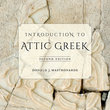|
TOPICS
Accent and Accent-Marking in Ancient Greek
Contonation and Mora
The Last 3 Syllables and the Accents
•acute
•circumflex
•grave
•ultima
•penult
•antepenult
•more examples
Proclitics
Enclitics
Multiple Clitics
Traditional Terminology
Persistent Accentuation
• a- and o-declension
• consonant declension
Recessive Accentuation
|
The Last Three Syllables and the Accents (9 of 9): further examples |
Previous | Next |
 |
(Contonation is underlined in the following examples.)
ἀγαθός |
short U accented with acute, in isolation;
no mora follows the contonation on U |
ἀγαθὸς ἄνθρωπος |
short U accented with grave in connected phrase;
no mora follows the contonation on U |
ψυχή |
long U accented with acute, in isolation;
no mora follows the contonation on U |
ψυχὴ ἀνθρώπου |
long U accented with grave in connected phrase;
no mora follows the contonation on U |
ἀγαθοῦ |
long U accented with circumflex, regardless of position;
no mora follows the contonation on U |
νόμος, νόμου |
short accented P, acute regardless of quantity of U;
no mora follows the contonation on P + U |
πεῖραι |
long accented P, short U, circumflex;
one mora follows the contonation on P |
πείραις |
long accented P, long U, acute;
no mora follows the contonation on P + U |
ἄνθρωπε |
accented A, short U, acute;
one mora follows the contonation on A + P |
|
 Accentuation Tutorial
Accentuation Tutorial
